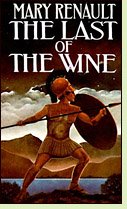The Last of the Wine
by Mary Renault
Reviewed by David Maclaine

In The Last of the Wine, the long Peloponnesian War against Sparta underpins a story centering on the life of Athens and the circle of young men around Socrates, or as the author spells it, Sokrates. Alcibiades, spelled Alkibiades, is present too, a key figure but often off-stage while the novel focuses on the coming to manhood of its narrator, a young Athenian nobleman named Alexias, and of Lysis, the man who becomes the love of Alexias' life. The novel's chief concern is the sort of Greek love that inspired Plato's great dialogues, Symposium and Phaedrus. Alexias' solution to the eternal tension between virtue and desire is not quite that of Plato, here seen as a member of the circle around Sokrates. That circle is full of names familiar from the Platonic dialogues: Kritias, Charmides and Phaedo; and of others, like Xenophon, famed for their own historic deeds.
While the settings of various episodes vary widely, the focus of the story is Athens, in the households of the protagonists and in the bustling streets where Sokrates seeks and passes on wisdom. Through the characters we experience the rigors of the war and the trials of its aftermath, when the beaten Athenians suffered from and eventually rebelled against the arbitrary rule of the oligarchs installed by the Spartans. Some novels probe more deeply into the politics of the Greek states, some convey more keenly the sweat and blood of their battlefields, but none captures better than The Last of the Wine the private lives of their citizens, especially the intersection of the individual with the public life of the city that defined the Athenian soul. This clearly ranks among the three best novels Renault wrote, and an argument can be made for it as the best novel ever written about the ancient Greeks. (1956, 389 pages)
More about The Last of the Wine at Powell's Books, Amazon.comThe Last of the Wine appears on the list of The 36 Best Historical Novels for a Survey of Ancient Greek History
Other novels in which Socrates appears:
Creation by Gore Vidal (1981), about a Persian ambassador to Athens and his travels through the ancient world, where he meets numerous key figures, including Socrates. See review or more info at Powell's Books
Tides of War by Steven Pressfield (2000), about the Athenian general Alcibiades and the land and sea battles he fought during the Peloponnesian War. See review or more info at Powell's Books
The Flowers of Adonis by Rosemary Sutcliff (1969), about the brilliant but erratic Athenian general Alcibiades. More info
Nonfiction about Socrates and Alcibiades:
Socrates: A Man for Our Time by Paul Johnson (2011). More info
Socrates: A Life Examined by Luis E. Navia (2007). More info
Alcibiades by P.J. Rhodes (2011). More info
Online:
Socrates at the Stanford Encyclopedia of Philosophy
Back to Novels of Ancient History
Back to Directory of Book Reviews